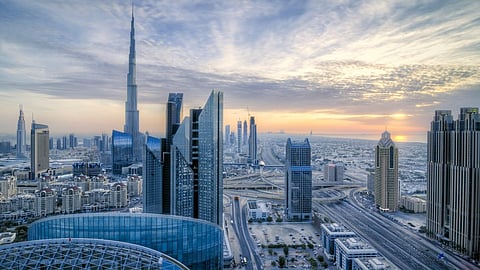How global property markets stack up against Dubai
High rental yields and tax benefits make Dubai a compelling investment destination

Dubai’s real estate market remains a top choice for international investors, offering a unique combination of strategic location, a dynamic skyline, and investor-friendly policies. According to analytics from Elite Merit Real Estate, Dubai stands out in several key metrics, offering higher rental yields and tax benefits compared to cities like New York, London and Singapore. This comprehensive analysis underscores Dubai's position as a compelling investment destination, backed by market data and insights from local experts.
Rental yields
“In Dubai, investors can achieve gross rental yields of 6-8 per cent, with prices rising steadily despite increasing supply,” explains Elkhan Salikhov, Co-founder and CEO of Elite Merit Real Estate. “Areas such as Jumeirah Village Circle and International City offer above-average yields, making them especially appealing for income-focused investments.”
New York’s rental yields average 3-5 per cent, constrained by high property prices. Manhattan typically sees lower returns, while boroughs like Brooklyn and Queens provide slightly better yields, though still below Dubai’s levels.
London’s yields range from 2-3.5 per cent, with high taxes and stamp duties further reducing net returns. Rent growth has slowed in recent years, particularly in prime segments, limiting profitability.
Singapore offers stable yet modest yields of 2-3 per cent, with select residential areas reaching 3-5 per cent. Commercial properties can provide higher returns, though overall profitability is tempered by market saturation and high entry costs.
Taxation and investor friendliness
Dubai offers a tax-free investment environment, with no property, capital gains, or rental income taxes. This favourable system positions Dubai as one of the most investor-friendly real estate markets globally.
In New York, investors face property, income, and capital gains taxes, with property tax rates varying by property class and assessed value. The city’s high tax burden can significantly reduce returns, particularly for long-term property holders.
London imposes up to 15 per cent stamp duties on high-value properties, alongside capital gains taxes. These charges, combined with high transaction costs, limit profitability and make high-value real estate purchases less appealing for some investors.
Singapore enforces high additional buyer’s stamp duties of 20 per cent or more for foreign investors, along with other regulatory fees. These taxes substantially impact returns, particularly for overseas buyers, making the market less accessible to some investors.
Price appreciation
“In Dubai, residential property prices surged by 20.7 per cent year-on-year as of the first quarter of 2024, with average retail rents rising 10.5 per cent, highlighting strong demand across both residential and retail sectors,” Salikhov adds.
London's price growth remains modest, at 1-3 per cent, influenced by post-Brexit uncertainties. High property taxes and reduced demand for luxury properties have slowed growth, particularly in central areas.
In New York, property prices are recovering post-pandemic, with growth rates averaging 3-5 per cent. While the market shows signs of recovery, high property prices continue to limit significant appreciation potential.
Singapore sees steady annual growth of around 5 per cent, supported by its status as a global financial hub. However, the market has shown signs of cooling, with condo resale prices recently declining for the first time in 10 months.
Market accessibility and liquidity
In Dubai, record-breaking transactions in 2024 reflect robust liquidity and flexible payment plans, making the market accessible to diverse investors. Bayut's 2024 Sales Market Report for the first half shows a 12.2 per cent increase in transactions, with off-plan properties seeing a 19 per cent rise, indicating growing interest from international buyers.
London remains a safe haven for long-term investors, but high costs and complex acquisition processes may deter some buyers. The £5-million-plus (Dh22.4 million) market showed resilience in the third quarter of 2024, though caution persists due to political and economic uncertainty.
In both New York and Singapore, markets are highly liquid but require significant capital to enter. In New York, particularly in prime areas like Manhattan, high property prices limit access to high-net-worth individuals, while Singapore’s high entry costs make it less accessible to average investors.
Why investors choose the UAE real estate market
Dubai offers a compelling mix of factors for real estate investment, including high rental yields, diverse property options, and significant tax advantages, such as no property or capital gains taxes. Its strong regulatory framework, managed by the Dubai Land Department, ensures transparency and investor protection. “A global tourism hub, Dubai benefits from steady short-term rental demand and a strategic location connecting markets in Asia, Europe and Africa,” he says. “Innovative urban developments, including smart cities and sustainability projects, enhance its appeal, while property investments often come with long-term residency opportunities.” Combined with its cultural diversity, thriving economy, and luxury lifestyle, Dubai stands out as a dynamic and resilient market.
Looking ahead, Dubai’s property market is set for sustained growth. “The Dubai 2040 Urban Master Plan and major projects like Expo City aim to accommodate a 55 per cent population increase over the next two decades, boosting demand for residential and commercial properties,” he adds. “With its focus on sustainability and affordable housing, Dubai remains a global business hub and a key destination for local and international investors.”
Don’t let risk derail your investments
Dubai’s property market holds great potential, but investors must address key risks, including volatility influenced by global economic trends, oil price fluctuations, and geopolitical factors. “Oversupply in certain segments, such as mid-range apartments, can also impact rental yields and capital appreciation,” says Salikhov. “To mitigate these challenges, investors should focus on high-demand, low-supply areas through thorough market research, diversify their portfolios across residential, commercial, and hospitality sectors, and collaborate with reputable developers and agents for transparent, reliable transactions.”
Elite Merit Real Estate offers expert guidance, helping investors identify high-growth, low-risk opportunities in key areas of Dubai. By staying informed about market trends and regulatory changes, investors can adapt swiftly, minimise risks, and capitalise on the lucrative opportunities the market presents.
This content comes from Reach by Gulf News, which is the branded content team of GN Media.